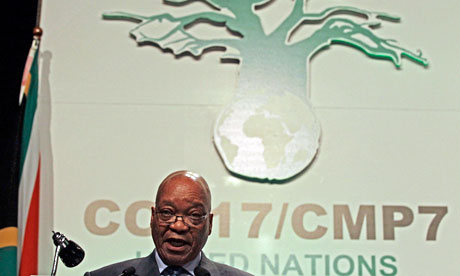By Mubatsi Asinja Habati
This week high level negotiations
that will deliver a new or move the Kyoto Protocol in circles begin as part of
continuation of the UN climate talks in Durban. The politicians officially
join the climate change-centred discussions tomorrow with slim chances of
striking an ambitious pact that will bind state governments to answer for their
carbon emissions if they fail to reduce them in a given time.
United Nations Secrtetary General
Ban Ki Moon ( who is already on the continment) and South African President Jacob Zuma will open the high level
segment of COP17 and the 7th Conference of the Parties (states) serving as the
Meeting of Parties (CMP7) on the afternoon of December 6.
The politicians join the climate
change conference at a time when several civil society organizations
are lobbying for new binding framework to the Kyoto Protocol and reduction in
carbon emissions, which cause variations in climate. But conditions for an
extended and sharpened Kyoto Protocol from major players like the European
and China led group of G77 are coming in the way of successful talks. Though
there is general need for a refreshed Kyoto Protocol, the guts to have it
delivered appear low.
 |
| President Zuma at the laucnh of COP17 on Nov. 28 |
Already the United States, a major
carbon emitter per capita, has said commitments to reducing the emissions in
the Kyoto protocol should be extended to 2020. But majority of the negotiators
are unwilling to buy into this. This afternoon a group of civil society executives
under the umbrella of Climate Action Network (CAN) International lashed at the
US stance and called on the Obama administration to either step up the fight on
the negative effect of climate change or stop blocking efforts to achieve an
agreement that will compel countries to reduce carbon emissions and save the
poor countries.
"The U.S. is pitching an
alarming narrative," said Celine Charveriat, Director of Advocacy and
Campaigns at Oxfam, in regard to the decade long time
frame the U.S government delegation at COP17 argues for as new targets to lower
emissions. "This perilous course must be stopped dead in its tracks. The
world's poorest people, who are already suffering the impacts of a changing climate,
cannot wait until another decade for action to bring emissions in line with
what science so clearly requires," Charveriat said.
More strong statements are likely to be
fired at any nation that proposes different opinions other than those the
African Group, AOSIS and LDCs want to hear from Durban. Kumi Naidoo,
Executive Director, Greenpeace International, said on December 3, the US
negotiators "eviscerated draft language on mitigation that would have
offered real protection to those who are being hardest and fastest hit by
climate changes that are already happening. The time has come for the US to
stand aside. If it is not willing to save lives, save jobs and save whole
ecosystems then it should get out of the way and let those who are willing move
on. Any failure to move beyond US obstructionism will be measured in lives.”
In a country where most of its
people spent 8 years debating the reality of climate change, Kumi's
statements could be dismissed as blackmail. But the fact is climate
change is real and is taking its toll on both the poor and rich countries
though in different intensities due adaptive mechanisms.
In Durban, outside the venue of COP17, different groups have been holding demonstrations calling on UN climate talk negotiators to save the world's poor farmers from impact of climate change. It remains to be seen if that call will be heeded.
In Durban, outside the venue of COP17, different groups have been holding demonstrations calling on UN climate talk negotiators to save the world's poor farmers from impact of climate change. It remains to be seen if that call will be heeded.
That said, the lobbying
for a better deal from the Durban COP17 is an ongoing process. The 6 days left
to end the two week long discussions remain critical for the life of the Kyoto
Protocol that expires next December. Uganda's Water and Environment Minister,
Maria Mutagamba who joined the talks today told the Uganda delegation that
optimism should be kept as she urged the African Group to remain united in
their position for a refreshed Kyoto Protocol.
“We’re not done here. But what this
process is not delivering ambition on emissions reductions. And that is not the
fault of the process. It is the fault of governments like the United States. In
fact, there is not a single scenario on the table right now that allows us to
avoid runaway climate change…while politicians continue to bicker around the
edges of the negotiations, we will be looking for leaders arriving this week to
engage on the real issues here. Civil society members are here to address the
urgent threat of climate change and ensure a future world where there is enough
food, water and energy for all. It might be good to ask governments why they’re
here,” said Jim Leape, Director General, WWF International.
No comments:
Post a Comment